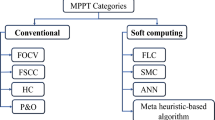Abstract
Partial shading and mismatch conditions among the series-connected modules/sub-modules suffer from a nonconvex power curve with multiple local maxima and decreased peak power for the whole string. Energy transfer between the sub-modules brings them to the same operating voltage, and this collective operation produces a convex power curve, which results in increased peak power for the string. The proposed topology benefits from the switched-capacitor (SC) converter concept and is an application for sub-module-level power balancing with some novelties, including stopping the switching in absence of shading, string-level extension, and a reduced number of power electronics components as compared to those in the literature. Reduction in the number of power electronics components is realized by the fact that two sub-modules share one SC converter. This leads to reduced power electronics losses as well as less cost and volume of the converter circuit. Insertion loss analysis of the topology is presented. The proposed topology is simulated in the PSpice environment, and a prototype is built for experimental verification. Both simulation and experimental results confirm the loss analysis. This proves that with the proposed topology it is possible to extract almost all the power available on the partially shaded string and transfer it to the load side.
Similar content being viewed by others
References
Chang, A.H., Leeb, S.B., 2014. Differential diffusion charge redistribution for photovoltaic cell-level power balancing. Int. Conf. on Renewable Energy Research and Applica-tion, p.576–582. http://dx.doi.org/10.1109/ICRERA.2014.7016450
Chang, A.H., Avestruz, A.T., Leeb, S.B., 2014. Capacitor-less photovoltaic (PV) cell-level power balancing using dif-fusion charge redistribution. 29th Annual IEEE Applied Power Electronics Conf. and Exposition, p.712–720. http://dx.doi.org/10.1109/APEC.2014.6803386
Chang, A.H., Avestruz, A.T., Leeb, S.B., 2015. Capacitor-less photovoltaic cell-level power balancing using diffusion charge redistribution. IEEE Trans. Power Electron., 30(2):537–546. http://dx.doi.org/10.1109/TPEL.2014.2340403
Choi, B., Clement, D., Maksimovic, D., 2014. A CMOS con-troller for submodule integrated converters in photovol-taic systems. IEEE 15th Workshop on Control and Mod-eling for Power Electronics, p.1–6. http://dx.doi.org/10.1109/COMPEL.2014.6877133
Giral, R., Ramos-Paja, C.A., Gonzalez, D., et al., 2010. Minimizing the effects of shadowing in a PV module by means of active voltage sharing. IEEE Int. Conf. on In-dustrial Technology, p.943–948. http://dx.doi.org/10.1109/ICIT.2010.5472551
Gokdag, M., Akbaba, M., 2014. Symmetric ladder connection design using diffusion charge redistribution for solar cell-level MPPT with reduced insertion loss. SOLARTR Conf. & Exhibition, p.720–726.
Kerekes, T., 2009. Analysis and Modeling of Transformerless Photovoltaic Inverter Systems. PhD Thesis, Aalborg University, Denmark.
Kesarwani, K., Stauth, J.T., 2012. A comparative theoretical analysis of distributed ladder converters for sub-module PV energy optimization. IEEE 13th Workshop on Control and Modeling for Power Electronics, p.1–6. http://dx.doi.org/10.1109/COMPEL.2012.6251780
Kim, K.A., Shenoy, P.S., Krein, P.T., 2012. Photovoltaic differential power converter trade-offs as a consequence of panel variation. IEEE 13th Workshop on Control and Modeling for Power Electronics, p.1–7. http://dx.doi.org/10.1109/COMPEL.2012.6251789
Levron, Y., Clement, D., Maksimovic, D., et al., 2013. Non-linear control design for the photovoltaic isolated-port architecture with submodule integrated converters. IEEE Energy Conversion Congress and Exposition, p.2398–2405. http://dx.doi.org/10.1109/ECCE.2013.6647008
Levron, Y., Clement, D., Choi, B., et al., 2014. Control of submodule integrated converters in the isolated-port dif-ferential power-processing photovoltaic architecture. IEEE J. Emerg. Sel. Top. Power Electron., 2(4):821–832. http://dx.doi.org/10.1109/JESTPE.2014.2326972
Olalla, C., Clement, D., Choi, B.S., et al., 2013. A branch and bound algorithm for high-granularity PV simulations with power limited SubMICs. IEEE 14th Workshop on Con-trol and Modeling for Power Electronics, p.1–6. http://dx.doi.org/10.1109/COMPEL.2013.6626429
Olalla, C., Deline, C., Maksimovic, D., 2014a. Performance of mismatched PV systems with submodule integrated converters. IEEE J. Photovolt., 4(1):396–404. http://dx.doi.org/10.1109/JPHOTOV.2013.2281878
Olalla, C., Deline, C., Maksimovic, D., 2014b. Modeling and simulation of conventionally wired photovoltaic systems based on differential power processing SubMIC-enhanced PV modules. IEEE 15th Workshop on Control and Modeling for Power Electronics, p.1–9. http://dx.doi.org/10.1109/COMPEL.2014.6877127
Olalla, C., Deline, C., Clement, D., et al., 2015. Performance of power-limited differential power processing architec-tures in mismatched PV systems. IEEE Trans. Power Electron., 30(2):618–631. http://dx.doi.org/10.1109/TPEL.2014.2312980
Pilawa-Podgurski, R.C.N., Perreault, D.J., 2013. Submodule integrated distributed maximum power point tracking for solar photovoltaic applications. IEEE Trans. Power Electron., 28(6):2957–2967. http://dx.doi.org/10.1109/TPEL.2012.2220861
Qin, S.B., Pilawa-Podgurski, R.C.N., 2013. Sub-module dif-ferential power processing for photovoltaic applications. 28th Annual IEEE Applied Power Electronics Conf. and Exposition, p.101–108. http://dx.doi.org/10.1109/APEC.2013.6520193
Qin, S.B., Cady, S.T., Domínguez-García, A.D., et al., 2013. A distributed approach to MPPT for PV sub-module dif-ferential power processing. IEEE Energy Conversion Congress and Exposition, p.2778–2785. http://dx.doi.org/10.1109/ECCE.2013.6647061
Seeman, M.D., Sanders, S.R., 2006. Analysis and optimization of switched-capacitor DC-DC converters. IEEE Work-shops on Computers in Power Electronics, p.216–224. http://dx.doi.org/10.1109/COMPEL.2006.305678
Shenoy, P.S., Johnson, B., Krein, P.T., 2012a. Differential power processing architecture for increased energy pro-duction and reliability of photovoltaic systems. 27th Annual IEEE Applied Power Electronics Conf. and Ex-position, p.1987–1994. http://dx.doi.org/10.1109/APEC.2012.6166095
Shenoy, P.S., Kim, K.A., Krein, P.T., 2012b. Comparative analysis of differential power conversion architectures and controls for solar photovoltaics. IEEE 13th Workshop on Control and Modeling for Power Electronics, p.1–7. http://dx.doi.org/10.1109/COMPEL.2012.6251782
Shenoy, P.S., Kim, K.A., Johnson, B.B., et al., 2013. Differ-ential power processing for increased energy production and reliability of photovoltaic systems. IEEE Trans. Power Electron., 28(6):2968–2979. http://dx.doi.org/10.1109/TPEL.2012.2211082
Stauth, J.T., Kesarwani, K., Schaef, C., 2012a. A distributed photovoltaic energy optimization system based on a sub-module resonant switched-capacitor implementation. 15th Int. Power Electronics and Motion Control Conf., p.1–6. http://dx.doi.org/10.1109/EPEPEMC.2012.6397417
Stauth, J.T., Seeman, M.D., Kesarwani, K., 2012b. A resonant switched-capacitor IC and embedded system for sub-module photovoltaic power management. IEEE J. Solid-State Circ., 47(12):3043–3054. http://dx.doi.org/10.1109/JSSC.2012.2225731
Stauth, J.T., Seeman, M.D., Kesarwani, K., 2013. Resonant switched-capacitor converters for sub-module distributed photovoltaic power management. IEEE Trans. Power Electron., 28(3):1189–1198. http://dx.doi.org/10.1109/TPEL.2012.2206056
Author information
Authors and Affiliations
Corresponding author
Additional information
Project supported by the BAP Department of Karabuk University, Turkey (No. KBU-BAP-13/2-DR-010)
ORCID: Mustafa GOKDAG, http://orcid.org/0000-0001-5589-2278
Rights and permissions
About this article
Cite this article
Gokdag, M., Akbaba, M. A novel PV sub-module-level power-balancing topology for maximum power point tracking under partial shading and mismatch conditions. Frontiers Inf Technol Electronic Eng 17, 1388–1396 (2016). https://doi.org/10.1631/FITEE.1500322
Received:
Accepted:
Published:
Issue Date:
DOI: https://doi.org/10.1631/FITEE.1500322
Key words
- Sub-module-level maximum power point tracking (MPPT)
- Differential power processing (DPP)
- Distributed power converters
- Switched-capacitor (SC) converters




